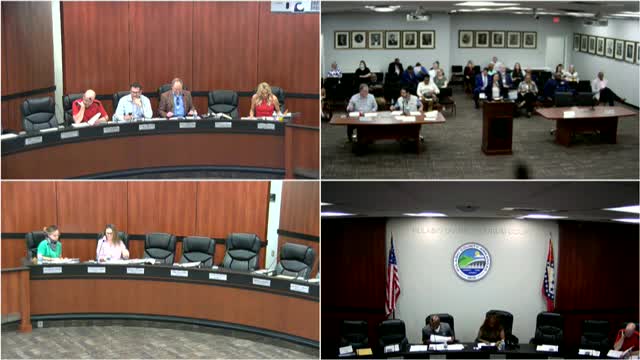Quorum Court committee forwards department budgets to full court; votes recorded on multiple items
Get AI-powered insights, summaries, and transcripts
Subscribe
Summary
The Pulaski County Quorum Court committee advanced a package of department budgets to the full court on procedural votes and separate motions, including the Election Commission, Human Resources and Sheriff's offices. An amendment to cut a sheriff fuel/lubricant increase failed.
The Pulaski County Quorum Court committee voted Tuesday evening to send multiple department budgets to the full court for final approval, including the Election Commission, Human Resources, sanitation, the coroner's office, the public defender conflicts budget and sheriff enforcement and detention budgets.
The committee approved a consent passage of a batch of 2026 departmental budgets that carried no requested maintenance-and-operations increases and then handled individual departmental budgets on motion. Most budget motions carried with unanimous or near-unanimous roll-call votes to move the items to the full court.
The package's most contested action came on the sheriff enforcement budget (department 400). A proposal to remove a $75,000 increase in the fuels, oil and lubricants line was introduced as an amendment and failed on a 3-5 vote. The main motion to forward the sheriff enforcement budget then passed 6-2.
Other departments were advanced with largely unanimous committee support. The committee recorded votes on the Election Commission's biennial election-year budget request and accepted a recommendation to forward it to the full court; members noted the county will be reimbursed for a substantial portion of election-year expenses by the state. The human resources budget (department 121) and several other department budgets were also sent forward after discussion of specific line items.
Votes at a glance
- Consent passage: batch of 2026 departmental budgets with no requested M&O increases — outcome: approved (8 ayes, 0 nays). - Department 109 (Election Commission) — motion to send to full court with a "due pass" recommendation — outcome: approved (8 ayes, 0 nays). - Department 121 (Human Resources) — motion to send to full court with a "due pass" recommendation — outcome: approved (8 ayes, 0 nays). - Department 416 (Prosecuting Attorney's office) — send to full court with due pass — outcome: approved (8 ayes, 0 nays). - Department 447 (Public defender conflicts) — committee accepted comptroller's recommendation to adjust the request and forward — outcome: approved (8 ayes, 0 nays). - Department 419 (Coroner) — send to full court with due pass — outcome: approved (8 ayes, 0 nays). - Department 700 (Sanitation/Animal Services) — send to full court with due pass — outcome: approved (8 ayes, 0 nays). - Department 400 (Sheriff enforcement) — main motion to send to full court with due pass — outcome: approved (6 ayes, 2 nays). Amendment to remove $75,000 for fuels/oils/lubricants — outcome: failed (3 ayes, 5 nays). - Department 418 (Detention) — send to full court with due pass — outcome: approved (7 ayes, 1 present). - Department 450 (Detention medical) — send to full court with due pass — outcome: approved (8 ayes, 0 nays).
Why it matters
The committee's votes move most departmental budgets to the full court for final approval. That vote will determine final county appropriations for the coming year and affects spending on elections, hiring and recruitment, public safety operations and county services such as sanitation and the coroner's office. The committee discussion also flagged several line items that the full court may revisit, including recurring software and licensing contracts and recruitment advertising spending.
What happened in committee
Committee members asked department representatives detailed questions about line-item increases. For the Election Commission, the committee discussed the expected election-year increase and the fact that the county will be reimbursed for the majority of those costs by the state. Human Resources staff described a pilot recruitment advertising program and provided contract figures for LinkedIn, ZipRecruiter and Indeed. The sheriff's office outlined a multi-year technology upgrade with Tyler Technologies and a Microsoft licensing cost and defended the requested increase in a fuel/lubricant line item.
Next steps
All forwarded budgets will appear on the full court agenda for final adoption. Committee members said they expect additional revenue data and more detailed cost analyses to be available before final action, and they discussed the possibility of addressing personnel compensation later in the budget cycle depending on revenue performance.
